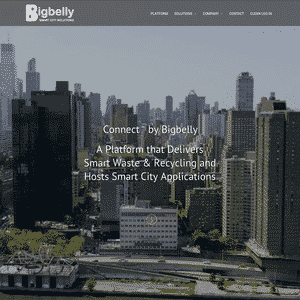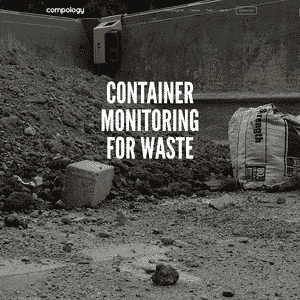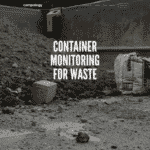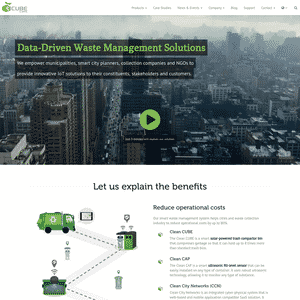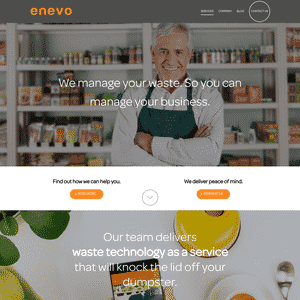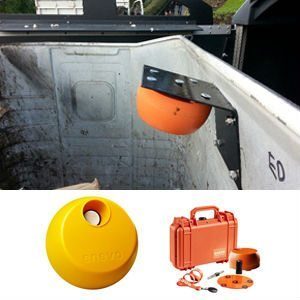
Smart Waste Management Systems
An overview of Smart City waste management market. View wireless solution providers, case studies and data platform offerings.
From densely populated cities to smaller rural communities, waste management systems keep our homes and communities free from unwanted clutter. Although these waste management services exist in nearly every community, the industry’s current operating standards have proven inefficient and highly resource-intensive.
This inefficiency is largely due to outdated manual collection methods and logistical processes which lack efficient data-driven solutions.
The waste management industry is beginning to develop and implement IoT-related solutions to these problems. From waste bins equipped with fill-sensors, to data-based management and logistics platforms, the industry is shifting into a cleaner, more efficient part of modern life.
The following Guide will help you:
- Better understand the currently available smart waste management tracking systems and how they work.
- Filter and compare solution providers.
- Get an overview of currently deployed case studies and their implementation results.
11/19/2019
Featured Provider
Nordsense
Nordsense Smart Waste Management uses artificial intelligence, machine learning and IoT, enabling cities to prevent bins from overflowing, and optimize routes to cut down on traffic congestion, fuel consumption, maintenance costs and carbon footprint
Companies
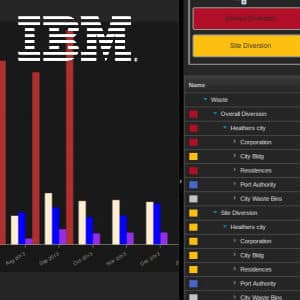
IBM INTELLIGENT WASTE MANAGEMENT PLATFORM
The IBM Intelligent Waste Management Platform has powerful analytic tools designed to accommodate a variety of functional areas and roles across...
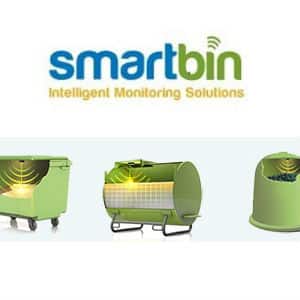
SMARTBIN
"SmartBin™, a OnePlus Systems company, is the global leader in remote monitoring and management systems for the waste collection industry....

URBIOTICA WASTE MANAGEMENT PLATFORM
"Our intelligent waste management solution involves applying technology (electronics and applications) to the current operating system to enable...
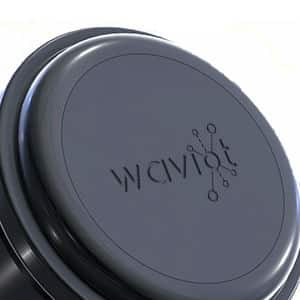
WAVIOT WASTE MONITORING
"Smart waste bin/container sensor for remote monitoring of waste containers collection. Sensor integrated with NB-Fi radio module enabling...
Investments / Acquisitions
Investments
- Enevo raises $12M (9/2017)
For a more complete list please download our Report
Additional Providers and Solutions:
Projects
ecoATM:
"With the tagline "instant cash for phones" the ecoATM kiosk's use the Axeda cloud platform and built in diagnostic tools to analyze the condition and quality of old consumer devices (currently targeting cellphones) and give users cash on the spot for their used electronics saving them from years of sitting in the junk drawer of your house and out of landfills creating toxic eWaste."
Senseable City Lab: Trash Track
"Elaborated by the SENSEable City Lab and inspired by the NYC Green Initiative, TrashTrack focuses on how pervasive technologies can expose the challenges of waste management and sustainability. Can these same pervasive technologies make 100% recycling a reality?
TrashTrack uses hundreds of small, smart, location aware tags: a first step towards the deployment of smart-dust - networks of tiny locatable and addressable microeletromechanical systems.These tags are attached to different types of trash so that these items can be followed through the city’s waste management system, revealing the final journey of our everyday objects in a series of real time visualizations."
Senseable City Lab: Forage Tracking - Tools for Participatory Recycling Management
"The Forage Tracking project is mapping the tacit knowledge and spatial organization of informal recyclers.
We are using location-detecting hardware and software to investigate how Catadores, informal recyclers in Brazilian cities, find and collect material in the city. We are also developing participatory platforms that will help them to organize their activities and connect the cooperative to the citizens."
Case Study: Smart waste bins on the streets of Berlin


Some futurists might see today’s shiniest Internet of Things technologies as indistinguishable from garbage, but for IoT companies serving the waste management industry the clever phrase can take on literal meaning.
Compology, a San Francisco startup, is applying sensors and machine intelligence to dumpsters and garbage trucks — and co-founder Jason Gates tells Postscapes that the team works hard to understand the specific needs of waste management and to design technology that gets the job done.
Gates calls garbage collection “one of the pillars of society.” Any gadget that joins the process needs to be rugged and reliable, even at construction sites and other areas where connectivity can be spotty. Consumer IoT products can count on Wi-Fi or Bluetooth and prioritize aesthetics. When your product lives in a dumpster, not so much. “It needs to work every time, and it doesn’t really matter much what it looks like,” Gates says.
That’s why Compology’s battery-powered sensors are “built like a tank”, as the company’s website puts it, and use simple sensing technology: the humble camera. Images snapped by the sensors are transmitted over the cell network and processed by cloud-based algorithms to detect how full each waste container is.
By combining data from all the dumpsters a waste management company serves, Compology creates dynamic, optimized routes and schedules for collection. Gates says the system can reduce the number of trucks needed by 40 percent, and uses historical data to make educated guesses about containers in low-connectivity areas that can’t report their status as often. “How we manage that is part of Compology’s ‘secret sauce’”, he says.
It also helps to protect the waste hauler’s margins, by revealing the actual cost of servicing each customer.
For truck drivers, Compology includes a purpose-built tablet that runs a custom application to deliver route information. Using standard hardware instead of a cross-device app allows for consistent design, which means everything from font size to screen layout can be optimized for safety and efficiency in the noisy, hectic cab of a garbage truck. “It’s not cute,” Gates says of the “tactically focused” application. “It’s very functional.”
Gates says Compology has customers across the U.S., from large operations to small fleets of just a few trucks — and the company is still growing its San Francisco team.
Additional resources
Background Articles
- Science Daily: Smart Trash Cans: RFID-Based Recycling Technology Makes Philadelphia Greener
- EE Times: Sorting out Smart Trash"The term "smart trash" is neither an oxymoron, like "military intelligence" or "promising semiconductor stock," nor a reference to a PhD living in a trailer park. It's a term for giving our waste stream enough intelligence to identify itself, assist in its own sorting and recycling process, and prevent the wrong stuff from ending up somewhere it can do harm."
- Cleveland.com: High-tech carts will tell on Cleveland residents who don't recycle ... and they face $100 fine
- Wall St Journal: Will Trash Cans Get Smart?
- Clean Technica: An “Internet Of Things” Approach to Cleaner, Greener Public Space
Whitepaper: SMART TRASH: Study on RFID tags and the recycling industry
Rand Europe



